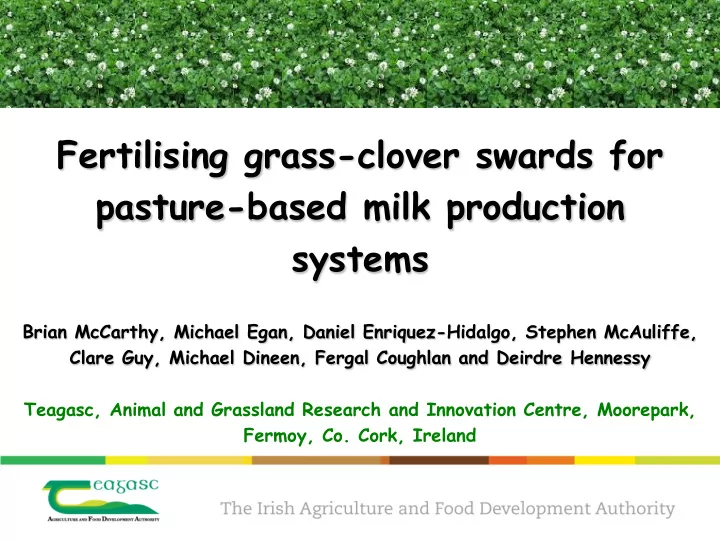

Fertilising grass-clover swards for pasture-based milk production systems Brian McCarthy, Michael Egan, Daniel Enriquez-Hidalgo, Stephen McAuliffe, Clare Guy, Michael Dineen, Fergal Coughlan and Deirdre Hennessy Teagasc, Animal and Grassland Research and Innovation Centre, Moorepark, Fermoy, Co. Cork, Ireland
Introduction Post milk quota abolition: need to maximise Ireland’s comparative advantage in pasture-based systems Renewed interest in forage legumes – white clover (WC) Animal performance Grass DM production Environmental sustainability How to incorporate white clover into intensive pasture- based production systems ?
N fertiliser application and sward type Grass production – 4 year average Grass only Grass clover 16 4.2 t DM/ha 1.8 t DM/ha Grass Production 12 (t DM/ha) 8 4 0 0 N 60 N 120 N 180 N 240 N N application rate (kg N/ha) 0 N 60 N 120 N 180 N 240 N Clover content (%) 33.3 30.6 27.0 21.7 19.6 N fixation (kg N/ha; 2011 - 2013) 1 220 205 148 122 112 1 Calculated using the N difference method, Enriquez-Hidalgo et al ., Grass Forage Science, In Press
Farm systems experiments with WC Clonakilty experiment – The effect of tetraploid and diploid swards sown with and without white clover on spring milk production systems 4 treatments: Tetraploid only sward, diploid only sward, tetraploid + clover sward, diploid + clover sward 30 cows per treatment stocked at 2.75 LU/ha, each treatment receiving 250 kg N/ha annually Moorepark experiment – Comparison of animal and sward production from grass-only sward receiving 250 kg N/ha and grass-clover swards receiving either 150 or 250 kg N/ha 3 treatments: Grass only 250 kg N/ha/year, grass + white clover 250 kg N/ha/year, grass + white clover 150 kg N/ha/year Stocked at 2.74 LU/ha
Fertiliser application on grass-clover swards Moorepark & Clonakilty Moorepark only Rotation/Date Grass-only Grass-clover Grass - clover 250 kg N/ha 250 kg N/ha 150 kg N/ha Mid-late January 28 28 28 Mid March 28 28 28 April (2 nd rot) 33 33 33 May (3 rd & 4 th rot) 60 60 18 June (5 th rot) 17 17 9 July (6 th & 7 th rot) 34 34 18 August (8 th rot) 17 17 9 Mid September 33 33 12 Slurry applied to all treatments at same rate Chemical P and K applied as per soil P and K index status
Daily pasture growth – Clonakilty 2014 39 % average 100 clover content Grass only Daily grass growth (kg DM/ha per 20 kg DM/ha 90 per day Grass clover 80 70 60 day) 50 40 2.5 t extra DM/ha 30 20 15.0 t DM/ha vs. 17.5 t DM/ha 10 0 Jan Feb Mar Apr May Jun Jul Aug Sep Oct Nov Month
Moorepark - Grass production & sward clover content (2013 & 2014) 50 Sward clover content (%) Clover 150 Clover 250 40 30 20 Clover 150 = 27% 10 Clover 250 = 24% 0 1 2 3 4 5 6 7 8 9 Rotation Treatment Grass 250 Clover 250 Clover 150 Annual Grass production 14.2 14.3 14.4 (t DM/ha)
Clonakilty - Milk Production 2014 2.50 TO + 55 kg Milk solids (kg/cow per day) MS/cow DO 2.00 TC DC 1.50 1.00 0.50 0.00 1 3 5 7 9 11 13 15 17 19 21 23 25 27 29 31 33 35 37 39 41 43 45 Lactation week 1 TO = tetraploid only; DO = diploid only; TC = tetraploid + clover; DC = diploid + clover
Summary As N fertiliser rate increases clover content and N fixation decreases Pasture DM Production response (0 to 2.5 t DM/ha) Milk Production response (+ 55 kg milk solids/cow) Initial results promising, further research required
Thank you & Questions?
Recommend
More recommend